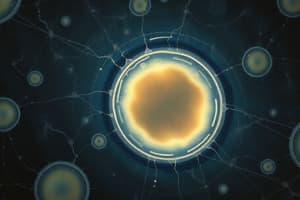Podcast
Questions and Answers
What is the definition of a Cell?
What is the definition of a Cell?
- The smallest functional and structural unit of all living organisms. (correct)
- A group of tissues working together.
- A type of membrane-bound organelle.
- The largest functional unit of living organisms.
What is the role of the Cell Membrane?
What is the role of the Cell Membrane?
It acts as a barrier between the inside of a cell and the cell's environment.
What is an Organelle?
What is an Organelle?
A specialized structure within a cell's cytoplasm that performs a specific function.
Define a Nucleus in the context of a eukaryotic cell.
Define a Nucleus in the context of a eukaryotic cell.
Prokaryotes have a nucleus.
Prokaryotes have a nucleus.
Eukaryotes include bacteria.
Eukaryotes include bacteria.
What is the function of the Cell Wall?
What is the function of the Cell Wall?
What is the Cytoskeleton?
What is the Cytoskeleton?
What is the function of Ribosomes?
What is the function of Ribosomes?
What does the ER assist with?
What does the ER assist with?
What is the purpose of Mitochondria?
What is the purpose of Mitochondria?
What process occurs in Chloroplasts?
What process occurs in Chloroplasts?
What is the function of the Golgi?
What is the function of the Golgi?
What is a Vesicle?
What is a Vesicle?
What does a Lysosome do?
What does a Lysosome do?
Flashcards are hidden until you start studying
Study Notes
Characteristics of Cells
- Cells are the smallest functional and structural units of all living organisms, containing a nucleus, cytoplasm, and a membrane.
- The cell membrane serves as a protective barrier, regulating what enters and exits the cell.
- Organelles are specialized structures within the cytoplasm of a cell, each performing unique functions.
- The nucleus, found in eukaryotic cells, houses the cell's DNA and is involved in growth, metabolism, and reproduction.
- Prokaryotes are single-celled organisms, such as bacteria, lacking a nucleus and membrane-bound organelles.
- Eukaryotes possess cells with a membrane-bound nucleus; this category includes protists, animals, plants, and fungi, excluding bacteria.
- The cell wall surrounds the cell membrane, providing structural support, and is present only in plant cells.
- The cytoskeleton is a network of protein filaments that gives shape, aids movement, and assists in cell division.
- Ribosomes are organelles made of RNA and protein, crucial for protein synthesis within the cell.
- The endoplasmic reticulum (ER) consists of membranes in the cytoplasm that process and transport proteins and lipids; the rough ER is studded with ribosomes.
- Mitochondria are responsible for breaking down food into energy, known as ATP, and require oxygen for this process.
- Chloroplasts, found in plants and algae, are the sites of photosynthesis where sunlight is converted into energy.
- The Golgi apparatus packages and modifies materials for export from the cell.
- Vesicles are small sacs that store and transport materials within eukaryotic cells; vacuoles, primarily in plant cells, are larger and hold water.
- Lysosomes contain enzymes that digest and eliminate waste materials and harmful particles, functioning as the cell's cleaning system.
Studying That Suits You
Use AI to generate personalized quizzes and flashcards to suit your learning preferences.




